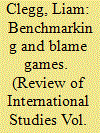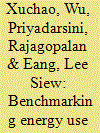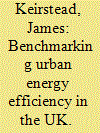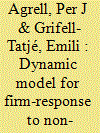|
|
|
Sort Order |
|
|
|
Items / Page
|
|
|
|
|
|
|
| Srl | Item |
| 1 |
ID:
142238


|
|
|
|
|
| Summary/Abstract |
Benchmarking has long been a central component of the global development industry, with the most prominent recent initiative being the Millennium Development Goal (MDG) framework. However, within existing scholarship, the agent-level interactions surrounding the MDG framework remain under-explored. Here, on the back of an analysis of interactions that took place within and around key MDG review summits, I develop a typology to clarify the intersection of benchmarking and blame games. Overall, I demonstrate that despite the efforts of the MDG architects to insulate the initiative, blame games have permeated policymakers’ engagements with the framework. Moreover, the content of these blame games have been carried over into the recently outlined Sustainable Development Goals (SDGs). A pattern of strategic clarification has seen the emergence within this follow-on SDG framework of more precise responsibilities on higher-income states to meet aid targets, and on lower-income states to meet governance reform targets. Given the deeply-embedded cleavages that were evident in UN review summits, similar blame games seem likely to follow the periodic evaluations within the SDGs’ lifespan.
|
|
|
|
|
|
|
|
|
|
|
|
|
|
|
|
| 2 |
ID:
097432


|
|
|
|
|
| Publication |
2010.
|
| Summary/Abstract |
Hotel buildings are reported in many countries as one of the most energy intensive building sectors. Besides the pressure posed on energy supply, they also have adverse impact on the environment through greenhouse gas emissions, wastewater discharge and so on. This study was intended to shed some light on the energy and environment related issues in hotel industry. Energy consumption data and relevant information collected from hotels were subjected to rigorous statistical analysis. A regression-based benchmarking model was established, which takes into account, the difference in functional and operational features when hotels are compared with regard to their energy performance. In addition, CO2 emissions from the surveyed hotels were estimated based on a standard procedure for corporate GHG emission accounting. It was found that a hotel's carbon intensity ranking is rather sensitive to the normalizing denominator chosen. Therefore, carbon intensity estimated for the hotels must not be interpreted arbitrarily, and industry specific normalizing denominator should be sought in future studies.
|
|
|
|
|
|
|
|
|
|
|
|
|
|
|
|
| 3 |
ID:
142236


|
|
|
|
|
| Summary/Abstract |
This article critically investigates the growing power and effectiveness of the ‘ethical’ compliance audit regime. Over the last decade, audits have evolved from a tool for companies to track internal organisational performance into a transnational governing mechanism to measure and strengthen corporate accountability globally and shape corporate responsibility norms. Drawing on original interviews, we assess the effectiveness of supply chain benchmarks and audits in promoting environmental and social improvements in global retail supply chains. Two principal arguments emerge from our analysis. First, that audits can be best understood as a productive form of power, which codifies and legitimates retail corporations’ poor social and environmental records, and shapes state approaches to supply chain governance. Second, that growing public and government trust in audit metrics ends up concealing real problems in global supply chains. Retailers are, in fact, auditing only small portions of supply chains, omitting the portions of supply chains where labour and environmental abuse are most likely to take place. Furthermore, the audit regime tends to address labour and environmental issues very unevenly, since ‘people’ are more difficult to classify and verify through numbers than capital and product quality.
|
|
|
|
|
|
|
|
|
|
|
|
|
|
|
|
| 4 |
ID:
126535


|
|
|
|
|
| Publication |
2013.
|
| Summary/Abstract |
This study asks what is the 'best' way to measure urban energy efficiency. There has been recent interest in identifying efficient cities so that best practices can be shared, a process known as benchmarking. Previous studies have used relatively simple metrics that provide limited insight on the complexity of urban energy efficiency and arguably fail to provide a 'fair' measure of urban performance. Using a data set of 198 urban UK local administrative units, three methods are compared: ratio measures, regression residuals, and data envelopment analysis. The results show that each method has its own strengths and weaknesses regarding the ease of interpretation, ability to identify outliers and provide consistent rankings. Efficient areas are diverse but are notably found in low income areas of large conurbations such as London, whereas industrial areas are consistently ranked as inefficient. The results highlight the shortcomings of the underlying production-based energy accounts. Ideally urban energy efficiency benchmarks would be built on consumption-based accounts, but interim recommendations are made regarding the use of efficiency measures that improve upon current practice and facilitate wider conversations about what it means for a specific city to be energy-efficient within an interconnected economy.
|
|
|
|
|
|
|
|
|
|
|
|
|
|
|
|
| 5 |
ID:
150832


|
|
|
|
|
| Summary/Abstract |
Economic network regulation increasingly use quantitative performance models (from econometrics and engineering) to set revenues. In theory, high-powered incentive regulation, such as revenue-caps, induces firms to cost-efficient behavior independent of underlying model. However, anecdotal evidence shows regulated firms occasionally maintaining cost-inefficiency under incentive regulation even under slumping profitability. We present a model for firm-level efficiency under a regime with a probability of failure explaining this phenomenon. The model is based on the hypothesis that the regulatory choice of method can be associated with intrinsic flaws leading to judicial repeal and replacement of it by a low-powered regime. The results show that the cost efficiency policy is proportional to the type of firm (cost of effort), value of time (discount factor) and the credibility of the method (risk of failure). A panel data set for 2000–2006 for 128 electricity distributors in Sweden is used to validate the model predictions (radical productivity slowdown, failing profitability and efficiency) at the launch and demise of a non-credible regulation method. The work highlights the fallacy of viewing incentive regulation as a method-independent instrument, a result applicable in any infrastructure regulation.
|
|
|
|
|
|
|
|
|
|
|
|
|
|
|
|
| 6 |
ID:
092862


|
|
|
|
|
| Publication |
2009.
|
| Summary/Abstract |
Incentive regulation for networks has been an important part of the reform agenda in a number of countries. As part of this regulatory process, incentives are put in place to improve the cost efficiency of network companies by rewarding good performance relative to a pre-defined benchmark. The techniques used to establish benchmarks are central to the efficiency improvements that are ultimately achieved. Much experience has been gained internationally in the application of benchmarking techniques and we now have a solid understanding of the main indicators of best practice. What we are lacking is a more complete understanding of the factors that influence choice of methods by regulators. In this paper, we present the results of an international survey of energy regulators in 40 countries conducted electronically between June and October 2008. Regulators from European, Australasian and Latin American countries are represented in the survey. Our results show that benchmarking techniques are now widespread in the regulation of gas and electricity networks. Best practice, however, is limited to a small number of regulators. We conclude by summarising existing trends and offering some recommendations on overcoming barriers to best practice efficiency analysis.
|
|
|
|
|
|
|
|
|
|
|
|
|
|
|
|
| 7 |
ID:
176657


|
|
|
|
|
| Summary/Abstract |
Buildings are by far the largest source of urban energy consumption. In an effort to reduce energy use, cities are mandating that buildings undergo energy benchmarking—the process of measuring building energy performance in order to identify buildings that are inefficient. In this paper, we examine the feasibility of using city-specific, public open data sources in two benchmarking models and compare the results to the same models when using the Commercial Building Energy Consumption Survey (CBECS) dataset, the basis for Energy Star. The two benchmarking models use datasets containing building characteristics and annual energy use from ten major cities. To examine the difference in performance between linear and non-linear models, we use random forest and lasso regression. Results demonstrate that benchmarking models using open data outperform models based solely on the CBECS dataset. Additionally, our results indicate that building area, property type, conditioned area, and water usage are the most important variables for cities to collect. Having demonstrated the benefits of using open data, we recommend two changes to current benchmarking practices: (1) new guidelines that support a data-driven benchmarking framework relying on open data and a transparent modeling process and (2) supporting policies that publicize benchmarking results and incentivize energy savings.
|
|
|
|
|
|
|
|
|
|
|
|
|
|
|
|
| 8 |
ID:
110715


|
|
|
|
|
| Publication |
2011.
|
| Summary/Abstract |
In this paper we use a best practice index constructed from the survey responses of regulators in 40 countries to explore the determinants of the methods used in electricity network regulation. Drawing from the incentive regulation and institutional economics literature, we construct an empirical model to investigate the impact of industry size, political and economic institutions on the degree of best practice regulation. Our results suggest that the existence and experience of an independent regulator is the most important institutional determinant of best practice regulation. In addition, small numbers of network companies act as a constraint on the use of advanced benchmarking methods. Finally, regional effects are also important. These findings lead us to question whether one "best practice" model is in fact applicable to countries with very different political and economic contexts.
|
|
|
|
|
|
|
|
|
|
|
|
|
|
|
|
| 9 |
ID:
126832


|
|
|
|
|
| Publication |
2014.
|
| Summary/Abstract |
Many different governments have begun to require disclosure of building energy performance, in order to allow owners and prospective buyers to incorporate this information into their investment decisions. These policies, known as disclosure or information policies, require owners to benchmark their buildings and sometimes conduct engineering audits. However, given substantial variation in the cost to disclose different types of information, it is natural to ask: how much and what kind of information about building energy performance should be disclosed, and for what purposes? To answer this question, this paper assembles and cleans a comprehensive panel dataset of New York City multifamily buildings, and analyzes its predictive power using a Bayesian multilevel regression model. Analysis of variance (ANOVA) reveals that building-level variation is the most important factor in explaining building energy use, and that there are few, if any, relationships of building systems to observed energy use. This indicates that disclosure laws requiring benchmarking data may be relatively more useful than engineering audits in explaining the observed energy performance of existing buildings. These results should inform the further development of information disclosure laws.
|
|
|
|
|
|
|
|
|
|
|
|
|
|
|
|
| 10 |
ID:
164701


|
|
|
|
|
| Summary/Abstract |
Most countries put significant amounts of time and effort in writing and issuing high-level policy documents. These are supposed to guide subsequent national defence efforts. But do they? And how do countries even try to ensure that they do? This paper reports on a benchmarking effort of how a few “best of breed” small- to medium-sized defence organisations (Australia, Canada, and New Zealand) deal with these issues. We find that most countries fail to link goals to resources and pay limited attention to specific and rigorous ex-ante or post-hoc evaluation, even when compared to their own national government-wide provisions. We do, however, observe a (modest) trend towards putting more specific goals and metrics in these documents that can be – and in a few rare cases were – tracked. The paper identifies 42 concrete policy “nuggets” – both “do’s and don’ts” – that should be of interest to most defence policy planning/analysis communities. It ends with two recommendations that are in line with recent broader (non-defence) scholarship on the policy formulation-policy implementation gap: to put more rigorous emphasis on implementation (especially on achieving desired policy effects), but to do so increasingly in more experiential (“design”) ways, rather than in industrial-age bureaucratic ones (“PPBS”-systems).
|
|
|
|
|
|
|
|
|
|
|
|
|
|
|
|
| 11 |
ID:
125717


|
|
|
|
|
| Publication |
2013.
|
| Summary/Abstract |
Benchmarking of electricity networks has a key role in sharing the benefits of efficiency improvements with consumers and ensuring regulated companies earn a fair return on their investments. This paper analyses and contrasts the theory and practice of international benchmarking of electricity transmission by regulators. We examine the literature relevant to electricity transmission benchmarking and discuss the results of a survey of 25 national electricity regulators. While new panel data techniques aimed at dealing with unobserved heterogeneity and the validity of the comparator group look intellectually promising, our survey suggests that they are in their infancy for regulatory purposes. In electricity transmission, relative to electricity distribution, choosing variables is particularly difficult, because of the large number of potential variables to choose from. Failure to apply benchmarking appropriately may negatively affect investors' willingness to invest in the future. While few of our surveyed regulators acknowledge that regulatory risk is currently an issue in transmission benchmarking, many more concede it might be. In the meantime new regulatory approaches - such as those based on tendering, negotiated settlements, a wider range of outputs or longer term grid planning - are emerging and will necessarily involve a reduced role for benchmarking.
|
|
|
|
|
|
|
|
|
|
|
|
|
|
|
|
| 12 |
ID:
104911


|
|
|
|
|
| Publication |
2011.
|
| Summary/Abstract |
We present five performance indicators for electricity generation for 129 countries using the 2005 data. These indicators, measured at the national level, are the aggregate CO2 intensity of electricity production, the efficiencies of coal, oil and gas generation and the share of electricity produced from non-fossil fuels. We conduct a study on the potential for reducing global energy-related CO2 emissions from electricity production through simple benchmarking. This is performed based on the last four performance indicators and the construction of a cumulative curve for each of these indicators. It is found that global CO2 emissions from electricity production would be reduced by 19% if all these indicators are benchmarked at the 50th percentile. Not surprisingly, the emission reduction potential measured in absolute terms is the highest for large countries such as China, India, Russia and the United States. When the potential is expressed as a percentage of a country's own emissions, few of these countries appear in the top-five list.
|
|
|
|
|
|
|
|
|
|
|
|
|
|
|
|
|
|
|
|
|